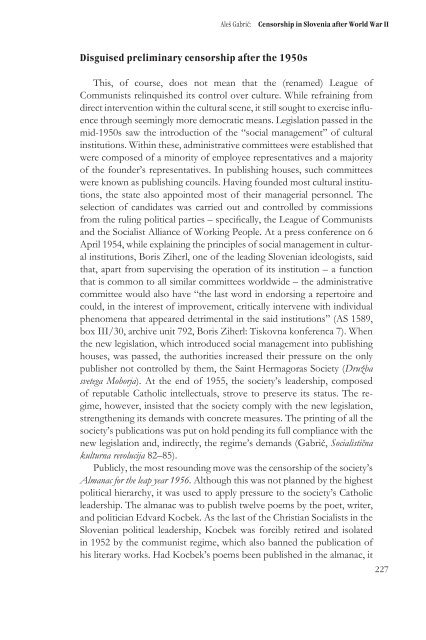Literatura in cenzura - Društvo za primerjalno književnost - ZRC SAZU
Literatura in cenzura - Društvo za primerjalno književnost - ZRC SAZU
Literatura in cenzura - Društvo za primerjalno književnost - ZRC SAZU
- No tags were found...
Create successful ePaper yourself
Turn your PDF publications into a flip-book with our unique Google optimized e-Paper software.
Aleš Gabrič:Censorship <strong>in</strong> Slovenia after World War IIDisguised prelim<strong>in</strong>ary censorship after the 1950sThis, of course, does not mean that the (renamed) League ofCommunists rel<strong>in</strong>quished its control over culture. While refra<strong>in</strong><strong>in</strong>g fromdirect <strong>in</strong>tervention with<strong>in</strong> the cultural scene, it still sought to exercise <strong>in</strong>fluencethrough seem<strong>in</strong>gly more democratic means. Legislation passed <strong>in</strong> themid-1950s saw the <strong>in</strong>troduction of the “social management” of cultural<strong>in</strong>stitutions. With<strong>in</strong> these, adm<strong>in</strong>istrative committees were established thatwere composed of a m<strong>in</strong>ority of employee representatives and a majorityof the founder’s representatives. In publish<strong>in</strong>g houses, such committeeswere known as publish<strong>in</strong>g councils. Hav<strong>in</strong>g founded most cultural <strong>in</strong>stitutions,the state also appo<strong>in</strong>ted most of their managerial personnel. Theselection of candidates was carried out and controlled by commissionsfrom the rul<strong>in</strong>g political parties – specifically, the League of Communistsand the Socialist Alliance of Work<strong>in</strong>g People. At a press conference on 6April 1954, while expla<strong>in</strong><strong>in</strong>g the pr<strong>in</strong>ciples of social management <strong>in</strong> cultural<strong>in</strong>stitutions, Boris Ziherl, one of the lead<strong>in</strong>g Slovenian ideologists, saidthat, apart from supervis<strong>in</strong>g the operation of its <strong>in</strong>stitution – a functionthat is common to all similar committees worldwide – the adm<strong>in</strong>istrativecommittee would also have “the last word <strong>in</strong> endors<strong>in</strong>g a repertoire andcould, <strong>in</strong> the <strong>in</strong>terest of improvement, critically <strong>in</strong>tervene with <strong>in</strong>dividualphenomena that appeared detrimental <strong>in</strong> the said <strong>in</strong>stitutions” (AS 1589,box III/30, archive unit 792, Boris Ziherl: Tiskovna konferenca 7). Whenthe new legislation, which <strong>in</strong>troduced social management <strong>in</strong>to publish<strong>in</strong>ghouses, was passed, the authorities <strong>in</strong>creased their pressure on the onlypublisher not controlled by them, the Sa<strong>in</strong>t Hermagoras Society (Družbasvetega Mohorja). At the end of 1955, the society’s leadership, composedof reputable Catholic <strong>in</strong>tellectuals, strove to preserve its status. The regime,however, <strong>in</strong>sisted that the society comply with the new legislation,strengthen<strong>in</strong>g its demands with concrete measures. The pr<strong>in</strong>t<strong>in</strong>g of all thesociety’s publications was put on hold pend<strong>in</strong>g its full compliance with thenew legislation and, <strong>in</strong>directly, the regime’s demands (Gabrič, Socialističnakulturna revolucija 82–85).Publicly, the most resound<strong>in</strong>g move was the censorship of the society’sAlmanac for the leap year 1956. Although this was not planned by the highestpolitical hierarchy, it was used to apply pressure to the society’s Catholicleadership. The almanac was to publish twelve poems by the poet, writer,and politician Edvard Kocbek. As the last of the Christian Socialists <strong>in</strong> theSlovenian political leadership, Kocbek was forcibly retired and isolated<strong>in</strong> 1952 by the communist regime, which also banned the publication ofhis literary works. Had Kocbek’s poems been published <strong>in</strong> the almanac, it227
















